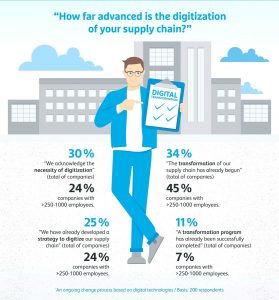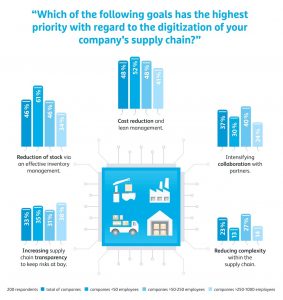[Hermes] – Although every second logistics manager believes that the corona pandemic is significantly driving the digitalisation of the supply chain in their own organisation, the digital transformation is only progressing slowly in many companies. This is one of the key findings of the 14th Hermes Barometer “Digital Transformation in Supply Chain Management” which is based on a survey conducted by Hermes Germany among 200 logistics managers in German companies.
Using digitalisation for making ones own supply chain more resilient and efficient: Against the backdrop of the ongoing pandemic, this is the goal of many logistics managers in German companies. Thus, 35 percent of the decision-makers surveyed plan to establish supply chain risk management (SCRM) as part of the digital transformation in order to make their own supply chain more resilient. “The resilience of the supply chain has received greater attention as a result of the pandemic. As a solution provider, we are constantly developing formats that show our customers which dependencies and risks may exist throughout their supply chains – in order to avoid them as well as possible,” explains Moritz Gborglah, Division Manager International Freight at Hermes International, a division of Hermes Germany.
Eight out of ten logistics managers (80 per cent) also believe that companies should invest in the digitalisation of the supply chain in order to better differentiate themselves from the competition in the future.
One in ten companies has successfully transformed its supply chains
30 per cent of the logistics decision-makers surveyed said they had created awareness of the need for digitalisation or had developed a strategy for digitalising their own supply chain (25 per cent). The necessity for digital transformation has thus been recognised.
Nevertheless, the digital transformation in supply chain management is progressing only very slowly: while 19 percent of respondents have stated in 2018 already that they had started to digitalise their supply chain, this figure has risen up to 34 percent of all companies surveyed. Only 11 percent of respondents have successfully implemented a transformation programme.
Large companies take the lead
The situation is different for large companies with more than 1,000 employees: Here, eight out of ten logistics managers (80 per cent) currently report having successfully implemented (40 per cent) or started (40 per cent) a transformation programme. “Among other things, large companies have greater financial and human resources to drive the change forward,” says Moritz Gborglah.
Cost reduction: the most important driver for the digital transformation
Particularly important drivers on the way to the digital supply chain are the desire to reduce costs and lean management as well as the reduction of inventories through effective inventory management – almost half of the respondents (48 per cent and 46 per cent respectively) assign great importance to these goals.
37 per cent of the decision-makers also named intensifying cooperation with partner companies as a significant goal. Increasing supply chain transparency to minimise risk is only of great importance to 33 per cent of those in charge. The latter figure is surprising against the background of numerous supply chain impairments due to the pandemic.
“The interdependencies in international supply chains are great. With intensified collaboration and increased transparency, considerable cost advantages arise. In addition, the risks within the supply chain can be greatly minimised,” Gborglah assesses the results.
Barriers to further digitisation
The hesitant digital transformation is also due to the complexity of larger transformation projects: 42 per cent of the logistics decision-makers surveyed agreed with the statement that they were reluctant to integrate new technologies due to the high complexity and concern about possible errors.
“The availability of know-how is therefore a critical factor for the progress of the digital transformation and thus the future viability of one’s own company,” Gborglah states. Against this background, it is not surprising that more than every other company plans to increasingly use the services of its logistics service providers in the digitalisation of the supply chain (56 percent). “We have already adapted to this change in demand and offer our customers corresponding solutions,” says Gborglah.
The majority of respondents have recognised the need to quickly drive forward the digital transformation of the supply chain. Now it is time to actively enter the process in order to secure their own agility and future viability in the long term.
Logistics experts like Hermes Germany support companies in identifying and exploiting optimisation potential along the supply chain. Within the framework of a holistic analysis, existing processes are examined and recommendations for action or concrete measures for increasing efficiency and improving sustainability within the supply chain are pronounced.
Please click here for the 14th Hermes Barometer (DE). Further information on the topic of supply chain optimisation and logistics can be found in the Hermes Supply Chain Blog.







